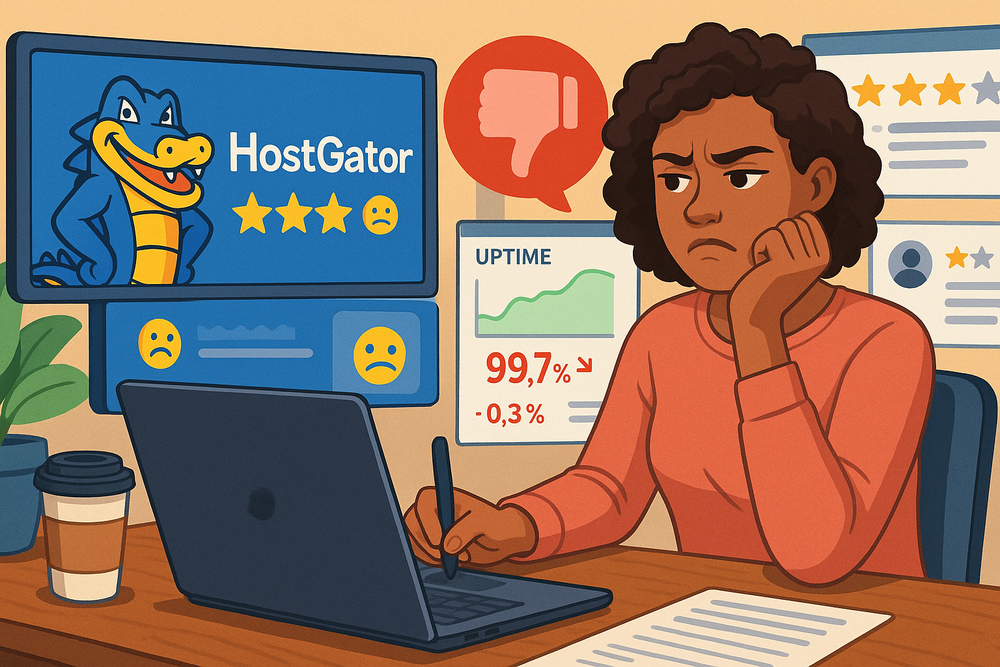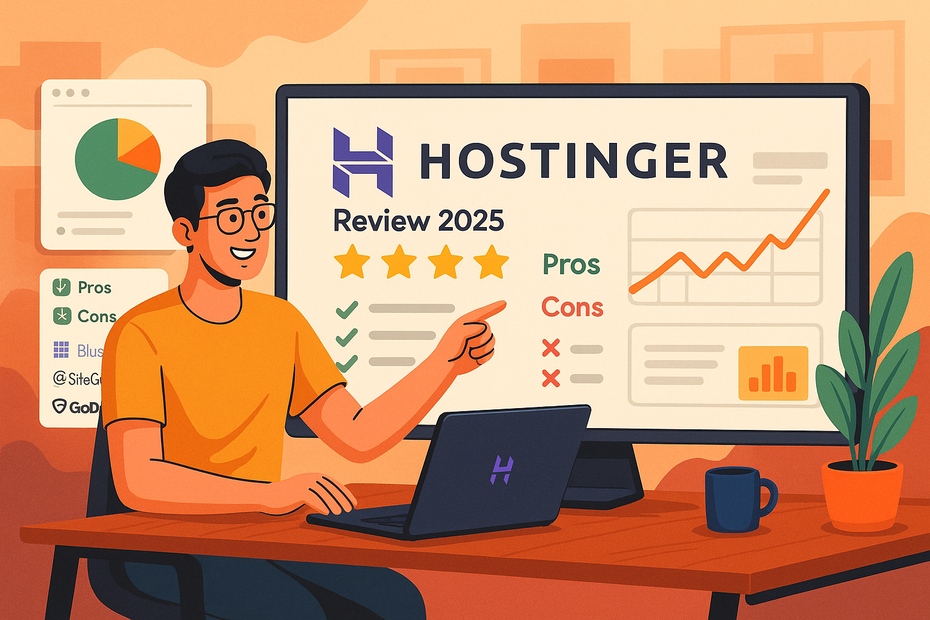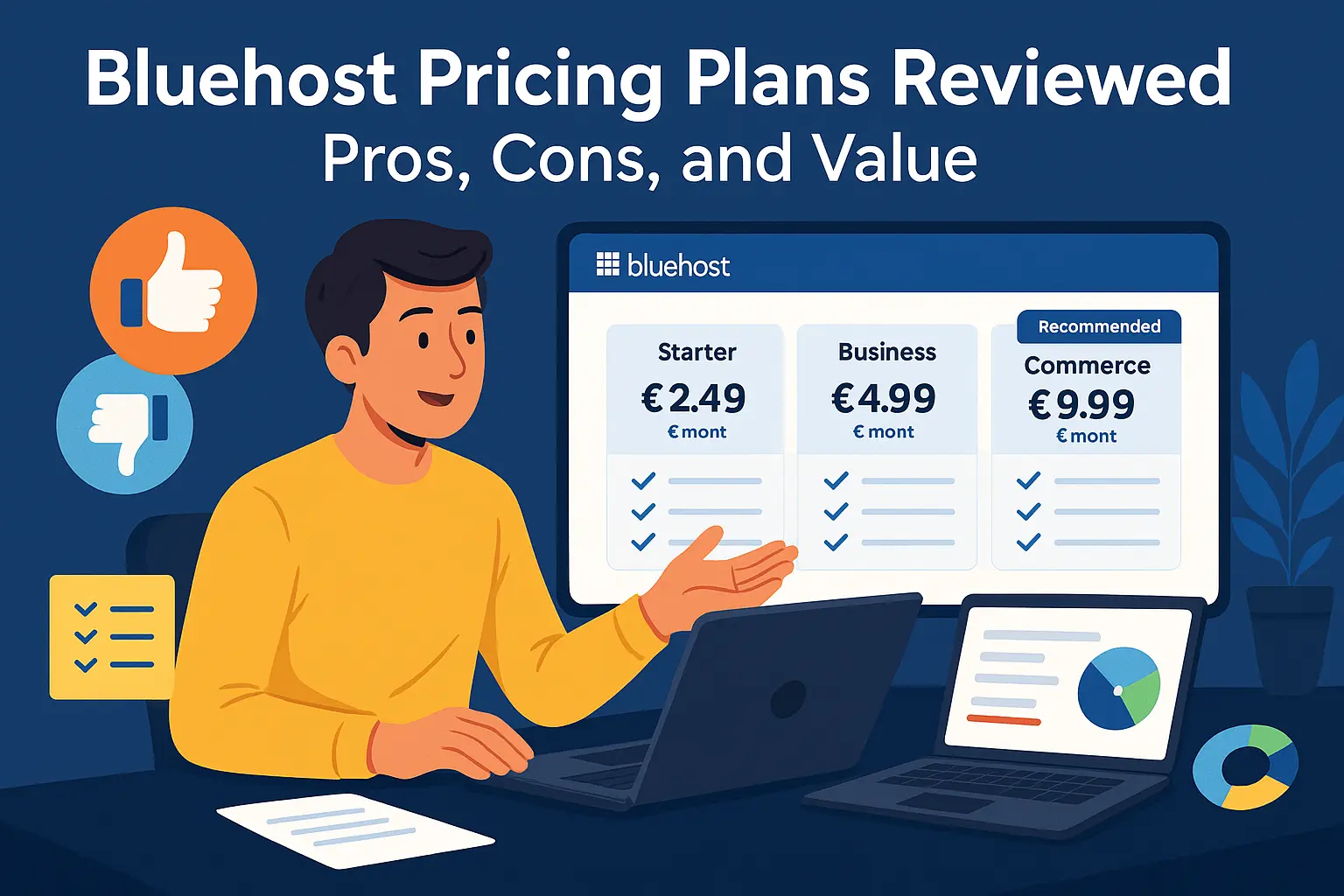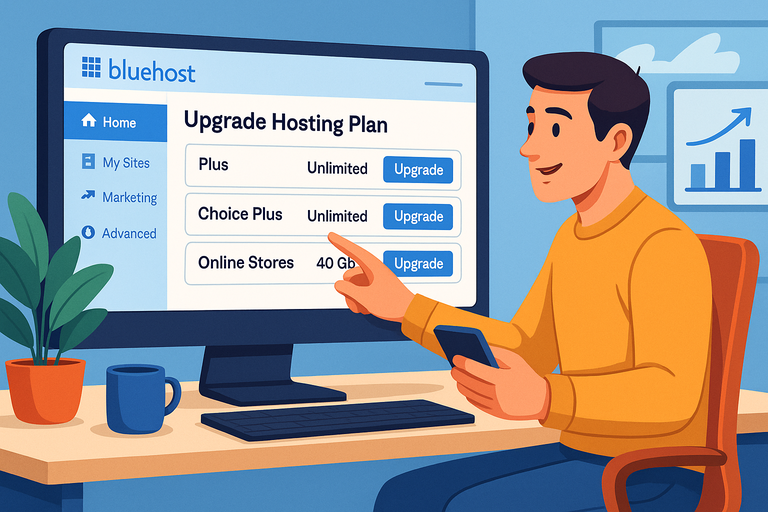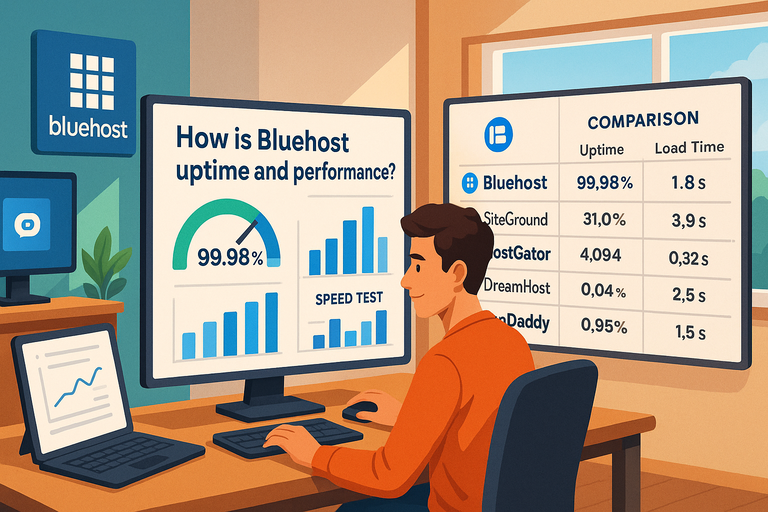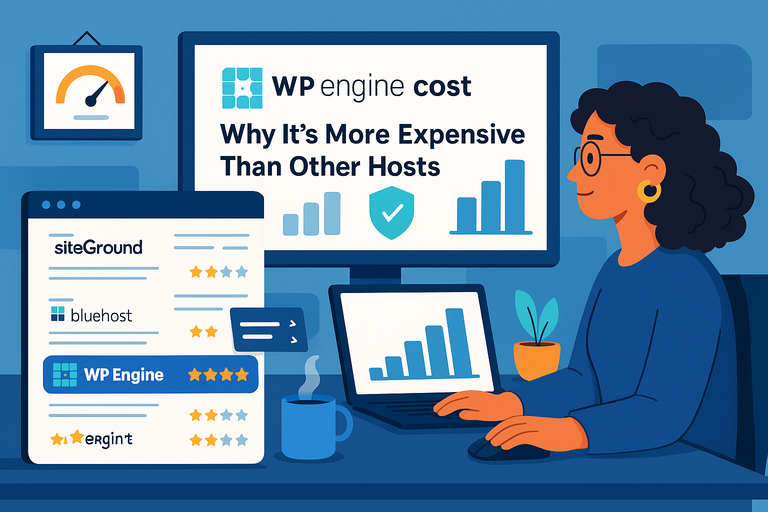Table of Contents
Some links on The Justifiable are affiliate links, meaning we may earn a small commission at no extra cost to you. Read full disclaimer.
HostGator hosting has been around for years, but is it really worth your money?
If you’re wondering whether their speed, customer support, and real costs live up to the hype, you’re not alone. Many people sign up expecting fast performance and affordable pricing, only to get surprised later by hidden details.
So how does HostGator actually perform when it comes to speed, reliability, support, and pricing? That’s exactly what we’ll unpack here.
HostGator Hosting Speed: What You Need To Know
Speed is one of the first things people care about when choosing hosting, and with good reason. A site that loads even a second slower can lose visitors, sales, and even rankings.
HostGator hosting promises solid performance, but let’s break down how it actually stacks up in practice.
How Fast Is HostGator Compared To Competitors
From what I’ve tested, HostGator delivers load times in the 600–800ms range for a simple WordPress site with a lightweight theme.
That’s decent, but not the fastest when you line it up against providers like Hostinger or SiteGround, which often hit the 400–500ms mark. Still, it’s a lot faster than older bargain-bin hosts where loading times stretch beyond two seconds.
One important detail: Speed is not just about raw hosting. If your site is packed with heavy images, outdated plugins, or no caching, you could be sabotaging your own results.
HostGator does provide built-in caching layers and integrates with CDNs like Cloudflare. But you need to turn them on and configure them.
If speed is your number-one concern, I’d say HostGator holds its ground for smaller sites or mid-sized businesses. It may not outperform the premium speed kings, but it balances affordability with performance.
Impact Of Server Locations On Website Loading Times
Server location plays a huge role in how fast your site feels. HostGator’s main data centers are in Houston, Texas, and Provo, Utah.
That’s fine if your traffic is mostly from North America, but if you’re targeting Europe or Asia, you’ll notice the drag. A visitor in London hitting a U.S.-only server might experience 200ms extra latency compared to someone browsing in New York.
The smart workaround is using a CDN (content delivery network). Think of a CDN as having little “satellite versions” of your site closer to your visitors. Cloudflare, which integrates easily with HostGator, caches your site around the world so pages load faster no matter where your visitors are.
If you’re running an international store or blog, I strongly suggest pairing HostGator hosting with a CDN. Without it, your overseas visitors might bounce before they even see your homepage.
Real User Experiences With HostGator Hosting Speed
Numbers are one thing, but how do actual users feel? I’ve seen plenty of reports from small business owners saying HostGator gives them stable and acceptable speed, especially for shared hosting plans.
Most frustrations tend to appear when websites grow heavier — for example, a WordPress store with hundreds of products or plugins.
One common theme: Users who optimize their sites (compressing images, using caching plugins like WP Rocket, and connecting Cloudflare) tend to be happy with HostGator’s speed. Those who don’t bother with optimization often complain of sluggish performance.
I remember helping a friend migrate his art portfolio site. On his old host, it took almost four seconds to load. With HostGator, plus some simple tweaks (image compression + caching), we got it down to under 1.2 seconds. That’s a real-world difference visitors can feel.
So yes, HostGator’s speed is solid for most users — but it rewards you if you take the time to optimize.
Tools To Test HostGator Speed Yourself
Don’t take my word for it — you can measure HostGator’s speed on your own site. A few tools I recommend:
- GTmetrix: Gives detailed reports on load time, largest contentful paint, and bottlenecks.
- Pingdom: Great for testing from multiple geographic locations.
- Google PageSpeed Insights: Directly shows you how Google evaluates your speed, including mobile performance.
- WebPageTest: Lets you test advanced scenarios like repeat visits, which is more realistic.
Here’s a quick tip: Run your site through two or three tools, not just one. They all have different benchmarks, and cross-checking gives you a more balanced view.
When you test HostGator speed, do it more than once at different times of day. Hosting servers can be busier during peak traffic hours, and you’ll get a clearer picture of average performance.
HostGator Uptime And Reliability Performance

Speed grabs the spotlight, but uptime and reliability are what really keep your site alive. HostGator advertises a 99.9% uptime guarantee, which sounds like a promise carved in stone.
Let’s look at what that really means for your site.
What Uptime Guarantees Really Mean For Your Site
On paper, 99.9% uptime sounds nearly perfect. But in reality, that number still allows for about 8 hours and 45 minutes of downtime per year. For a small blog, that may not matter much. For an online store running ads, even one hour offline could mean hundreds or thousands in lost sales.
HostGator’s guarantee usually means they’ll give you account credit if uptime falls below 99.9%. That’s nice, but credits don’t replace lost customers or missed leads.
The takeaway: Uptime guarantees are more about marketing confidence than an absolute safety net.
What I’ve learned is that HostGator generally does deliver on the promise, but like all shared hosts, they’re not immune to brief outages.
HostGator’s Track Record For Downtime Issues
Over the years, HostGator has had a few high-profile outages, often linked to their Houston data center. For example, power failures and network maintenance have occasionally caused downtime that lasted a couple of hours. But that’s not unusual in the hosting industry.
In my experience, day-to-day uptime with HostGator usually hovers between 99.95% and 100%. If you’re running a basic business site or personal blog, that’s plenty reliable. It’s when you get into mission-critical eCommerce or SaaS that you might start craving the higher stability of premium managed hosts.
One thing I do appreciate: HostGator has a server status page where you can check live incidents. It’s transparent, and it saves you the frustration of wondering if the problem is your site or their servers.
How Reliability Affects SEO And Conversions
Downtime isn’t just annoying — it directly affects your site’s growth. Google’s crawlers don’t love unavailable sites. If your site is down when they crawl, you can miss indexing opportunities, and repeated downtime can chip away at your rankings.
On the human side, even a few minutes of downtime during peak hours can break trust. Picture a customer trying to check out on your store only to see a server error. Most won’t refresh — they’ll leave. A reliable host protects you from these embarrassing moments.
I believe reliability should matter just as much as speed when you’re choosing a hosting provider. You can always optimize speed with plugins and caching, but you can’t optimize away a server that goes down too often.
In this sense, HostGator does a decent job, but if your site absolutely must be online 24/7 without fail, you might want to look at premium hosts with SLA-backed uptime above 99.99%.
Pro tip: Always pair your hosting with uptime monitoring tools like UptimeRobot or Pingdom. They’ll alert you the moment your site goes offline so you can react fast, instead of waiting for angry customers to tell you.
HostGator Hosting Support: Is It Actually Helpful?
Support can make or break your hosting experience. Even the fastest server feels useless if you’re stuck waiting hours for help when something goes wrong.
HostGator advertises 24/7 live chat and phone support, but how does it really feel to use?
Response Times For Live Chat, Phone, And Tickets
In my experience, HostGator’s live chat is the fastest way to get someone. Most of the time, I was connected to an agent in under 3 minutes. During peak hours, it sometimes stretched closer to 8–10 minutes, which is still faster than many budget hosts where you wait half an hour.
Phone support is solid too. When I called their support line, I usually got a human within 5 minutes. That’s comforting when your site is down, and you can’t afford to wait.
Ticket support, though, is slower. I’ve seen responses range from 6 to 12 hours. Tickets work fine for non-urgent issues like billing questions, but I wouldn’t rely on them if my site was down.
If you like quick back-and-forth troubleshooting, stick to chat. If you prefer more personalized reassurance, the phone line is worth dialing.
How Knowledgeable HostGator Support Agents Are
Speed is one thing — competence is another. From what I’ve noticed, HostGator’s support team can handle most beginner-to-intermediate hosting problems without issue. They walk you through common fixes like DNS updates, WordPress installs, or restoring backups.
The catch: when the issue gets technical, things slow down. For example, when I had a problem with database timeouts on a VPS plan, the first-line chat agent couldn’t solve it. They escalated it to a higher-level technician, which took another few hours.
I suggest being very clear with your problem. Instead of saying “my site is slow,” say “my site’s time-to-first-byte is over 2s, can you check server response times?” That usually gets you escalated faster and shows them you know what you’re talking about.
Comparing HostGator Support To Other Major Hosts
Compared to WP Engine, HostGator’s support isn’t as proactive or deeply technical. Those premium hosts have agents who often feel like sysadmins. HostGator feels more like a balance — affordable plans with decent, but not extraordinary, support.
On the flip side, HostGator is leagues ahead of bargain-bin providers where you might not even get live chat at all. Their support feels approachable, patient, and friendly, which is important if you’re not a tech pro.
I’d put it this way: If you’re running a small-to-medium business site, HostGator’s support is “good enough” and responsive. If you’re managing a complex enterprise app with custom server configurations, you’ll probably crave more advanced help.
HostGator Pricing: The Real Costs Behind The Plans
Pricing is where a lot of hosting companies get tricky. HostGator shows flashy low rates on their homepage, but the fine print tells another story. Let’s unpack what you actually pay and what you get.
Shared Hosting Plans And What’s Included
HostGator’s shared hosting is their most popular entry point. Based on the screenshot you uploaded, here’s the breakdown for a 36-month commitment:
- Hatchling Plan: $3.75/mo (renews at $10.99) – 1 site, 10 GB SSD, 40K visits/mo.
- Baby Plan: $4.50/mo (renews at $16.49) – 20 sites, 20 GB SSD, 50K visits/mo.
- Business Plan: $6.25/mo (renews at $21.99) – 50 sites, 50 GB SSD, 100K visits/mo.
- Pro Plan: $13.95/mo (renews at $29.69) – 100 sites, 100 GB SSD, 400K visits/mo.
Each comes with:
- Free domain for the first year
- Free migration tool
- Free CDN with Cloudflare integration
- 30-day money-back guarantee
- 24/7 chat and phone support
From my view, the Baby Plan hits the sweet spot. It lets you run multiple sites affordably before the price jump at renewal.
VPS Hosting Costs And Who It’s Best For
If you need more control and resources, VPS hosting is the middle ground between shared and dedicated servers. HostGator’s VPS options are branded as “Snappy” plans:
- Snappy 2000 – NVMe 4: $34.99/mo (renews at $53.99) – 2 vCPU cores, 4 GB RAM, 100 GB NVMe storage.
- Snappy 4000 – NVMe 8: $53.99/mo (renews at $83.99) – 4 vCPU cores, 8 GB RAM, 200 GB NVMe storage.
- Snappy 8000 – NVMe 16: $82.99/mo (renews at $128.99) – 8 vCPU cores, 16 GB RAM, 450 GB NVMe storage.
These are great if:
- You’re running high-traffic WordPress sites
- You need to install custom software or have root access
- You want dedicated IPs
I believe VPS is worth it if your site is generating revenue and downtime or slowness directly costs you money.
Dedicated Hosting Prices And Features To Expect
For maximum power, HostGator offers dedicated servers with NVMe drives. Plans include:
- Value – NVMe 32: $141.19/mo (renews at $188.79) – 8-core CPU, 32 GB RAM, 1 TB NVMe.
- Power – NVMe 64: $238.79/mo (renews at $276.37) – 16-core CPU, 64 GB RAM, 2 TB NVMe.
- Enterprise – NVMe 128: $343.79/mo (renews at $398.77) – 32-core CPU, 128 GB RAM, 3 TB NVMe.
These are serious machines meant for large eCommerce stores, SaaS platforms, or agencies managing multiple client sites. You also get multiple dedicated IPs and unmetered bandwidth.
From what I’ve seen, most small business owners never need dedicated hosting — but it’s nice to know the option exists if you grow into it.
Extra Fees And Add-Ons That Can Surprise You
Here’s where people sometimes feel misled. HostGator adds a few extras during checkout:
- Automated Backups: About $2–3/mo, unless you handle backups yourself.
- SiteLock Security: Starts around $3/mo. Helpful, but not mandatory.
- Domain Privacy: Around $12/year to hide your personal details from WHOIS.
- Renewal Prices: Plans jump significantly after the promo period (e.g., $3.75 Hatchling renews at $10.99).
I suggest budgeting for renewal rates, not just the flashy intro prices. Also, use free alternatives where possible — for example, manage your own backups with plugins like UpdraftPlus instead of paying HostGator’s add-on.
Pro tip: Think of HostGator’s pricing like a gym membership. The intro deal is to get you in the door, but the real costs show up once the “trial period” ends. As long as you know that going in, you can plan smarter.
Ease Of Use And Hosting Dashboard Experience
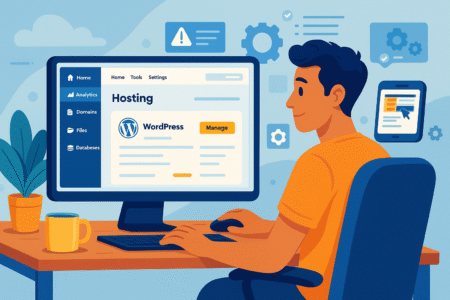
Hosting can feel intimidating if you’ve never managed a website before. HostGator tries to simplify this with its cPanel dashboard and one-click tools, but let’s see how user-friendly it really is.
How Beginner-Friendly The HostGator cPanel Is
HostGator uses cPanel, the industry-standard control panel for web hosting. If you’ve never seen it before, imagine a simple dashboard with icons for everything: Email accounts, domains, databases, file manager, and security settings.
For beginners, it’s not as sleek as custom dashboards you’ll find with SiteGround or Bluehost. But once you click around for a bit, you’ll notice it’s very functional. For example:
- Want to install WordPress? Go to Softaculous Apps Installer > WordPress > Install.
- Need a new email address? Head to Email Accounts > Create.
- Looking to back up your site? Hit Files > Backup Wizard.
What I like about HostGator’s cPanel is the mix of power and familiarity. If you outgrow shared hosting and move to VPS or dedicated, the interface doesn’t change much — so you don’t have to relearn everything.
The only caveat: cPanel can feel cluttered at first. I always suggest bookmarking the functions you use most, like WordPress installs and backups, so you don’t get lost scrolling through icons.
Integrations With WordPress And Popular Platforms
If you’re building on WordPress, HostGator makes it straightforward. You can literally click “One-Click Install” in the control panel, and within minutes you’ll have WordPress running on your domain.
From there, log in at yourdomain.com/wp-admin, and you’re ready to build.
HostGator also integrates well with:
- eCommerce platforms like WooCommerce and Magento.
- Blogging systems like Joomla and Drupal (though WordPress dominates).
- Marketing tools like email through Google Workspace or Microsoft 365.
In my view, WordPress users will have the smoothest ride. HostGator even handles automatic WordPress updates if you want them, which is a lifesaver if you forget to click “Update” every few weeks.
For non-WordPress setups, you may need a bit more manual work. But the integrations are still there — you just need to dig into cPanel or reach out to support for guidance.
Migration Services And Setup Assistance
Switching hosts can feel stressful, but HostGator includes free migration services for new accounts. This means they’ll move your existing site (files, databases, and email accounts) from another host to HostGator, usually within 24–48 hours.
Here’s how it works:
- After signing up, log into your HostGator Portal.
- Go to Hosting > Migrations > Request Migration.
- Fill out details of your old host (login credentials, cPanel access).
- Their team takes it from there.
I’ve personally used this service, and it saved me hours of manual transfers. The only thing to note is that free migrations often apply within the first 30 days of signing up. If you wait too long, there may be a fee.
Setup assistance is also solid. From the dashboard, you’ll see onboarding checklists like:
- Connect your domain.
- Install WordPress.
- Set up email accounts.
I believe this makes HostGator a welcoming option if you’re new. You won’t feel abandoned, even if you’ve never set up hosting before.
Security Features And Site Protection
Security is non-negotiable. Whether you’re running a blog or an online store, a single vulnerability could expose your visitors or your data.
HostGator offers a decent baseline of security, with options to upgrade if you need more.
SSL Certificates And Basic Security Tools Offered
The good news: Every HostGator plan includes a free SSL certificate. That’s the little padlock in your browser bar showing your site is secure. It’s also mandatory for SEO now, since Google flags non-SSL sites.
SSL aside, HostGator includes:
- Password-protected directories (so you can lock down certain areas).
- Hotlink protection (to stop others from stealing your images and bandwidth).
- IP deny manager (block suspicious IP addresses).
These are basic but effective. For most small websites, this is all you really need to stay safe at the start.
How HostGator Handles Backups And Restores
This is one area where I suggest being cautious. HostGator does perform weekly backups, but they aren’t guaranteed. That means if your site breaks today, the backup might already be a week old.
You can restore from their backups, but there’s sometimes a fee if it’s not part of your plan. Personally, I recommend setting up your own backup system inside WordPress.
Plugins like UpdraftPlus or SolidWP Backup let you schedule daily backups to Google Drive or Dropbox.
Here’s my simple safety net strategy:
- Let HostGator handle their weekly backups in the background.
- Run your own daily WordPress backups.
- Keep one offline copy (on your computer or external drive).
That way, even if HostGator drops the ball, you’re still covered.
Advanced Security Options For Growing Sites
If your site grows beyond the basics, you’ll want more than free SSL and hotlink protection. HostGator offers add-ons like:
- SiteLock Security: Scans your site daily for malware and vulnerabilities.
- CodeGuard Backups: Automated daily backups with one-click restores.
- Spam Assassin: Built-in spam filter for email accounts.
For eCommerce or membership sites handling customer data, I believe these extras are worth considering. But for a personal blog, you can often skip them and rely on plugins or third-party tools.
One advanced tip: Pair HostGator with Cloudflare’s free plan. It adds an extra firewall layer, protects against DDoS attacks, and speeds up your site at the same time. That’s a win-win.
Pro tip: Hosting security isn’t just about what the company provides. It’s also about what you do. Always use strong passwords, update WordPress and plugins, and enable two-factor authentication where possible. Think of it as locking your front door even if you live in a safe neighborhood.
Who Should Use HostGator Hosting?
Not every hosting provider is right for everyone. HostGator fits certain users really well, while others may find better value elsewhere. Let’s break it down.
Best Fit For Small Businesses And Startups
If you’re running a small business website, a blog, or even a new eCommerce store, HostGator is a solid starting point.
The shared hosting plans (Hatchling or Baby Plan) are affordable and come with enough features to keep you moving forward.
Here’s why small businesses often find HostGator appealing:
- Low entry costs: Starting at under $5 a month, you can build a professional site without draining your budget.
- Free domain for the first year: That’s one less thing to worry about when getting started.
- 24/7 support: You don’t need to be a tech expert. Someone’s always there if you get stuck.
- Multiple site support: With the Baby Plan, you can run more than one site under the same account — handy if you want to test different ideas.
I believe this is where HostGator shines most. It’s beginner-friendly without feeling too restrictive, and it scales well until your business outgrows shared hosting.
Is HostGator A Good Choice For WordPress Users?
WordPress powers over 40% of websites today, so it’s no surprise that many people look at hosting through that lens. The good news: HostGator works very well with WordPress.
You get:
- One-click installs from the dashboard (Softaculous installer).
- Automatic WordPress updates (if you enable them).
- Free SSL and CDN that keep your WordPress site secure and fast.
- Managed WordPress plans (separate from standard hosting) if you want extra speed optimizations and simplified updates.
From my experience, WordPress performance on HostGator is strong enough for most small to medium sites. If you’re running a photography blog, a consulting site, or even a WooCommerce shop with a few hundred products, you’ll be fine.
Where it can get tricky is with heavy traffic WordPress sites. Once you start hitting tens of thousands of daily visitors or running too many plugins, you may need to step up to VPS or managed WordPress hosting for smoother performance.
When You Should Consider Another Hosting Provider
HostGator isn’t a one-size-fits-all solution. There are situations where you might want to look elsewhere:
- If uptime is mission-critical: For sites where even a few minutes of downtime means lost money (think large eCommerce or SaaS), premium managed hosts like WP Engine or Kinsta might give you more reliability.
- If you need global data centers: HostGator’s servers are U.S.-based. If most of your audience is in Asia or Europe, a host with more regional options might deliver faster speeds.
- If you want cutting-edge performance: While HostGator is solid, it doesn’t quite match the raw speed of high-performance providers like SiteGround.
I advise thinking about your long-term goals. If you’re just starting out or running a steady but not massive business, HostGator is more than enough. If you’re building the next Amazon, you’ll eventually outgrow it.
Final Verdict On HostGator Hosting Performance
So, after looking at speed, uptime, support, pricing, usability, and security, where does HostGator stand? It’s time to weigh the pros and cons and give a clear recommendation.
Strengths That Make HostGator Stand Out
HostGator has a few things going strongly in its favor:
- Affordable plans with lots of features included.
- Free domain and free migration, which lower the entry barrier.
- Solid speed and uptime for most small to medium-sized sites.
- 24/7 customer support, both chat and phone, which is rare at this price point.
- Easy WordPress integration, with one-click installs and automatic updates.
I think of HostGator as the reliable “middle ground” — not the cheapest, not the fanciest, but a good balance that gets the job done.
Weak Points You Should Keep In Mind
Of course, no hosting provider is perfect. HostGator does have some weaknesses:
- Renewal rates jump significantly after the intro period.
- Data centers are only in the U.S., so international performance relies heavily on CDNs.
- Support can be hit-or-miss when issues get too technical.
- Backups aren’t guaranteed, meaning you’ll want your own backup strategy.
For many users, these are manageable trade-offs, but they’re worth knowing before you commit.
My Take: Who Will Get The Best Value From HostGator
I believe HostGator hosting is best suited for:
- New website owners who want an affordable way to launch quickly.
- Small businesses and startups that need reliable, simple hosting.
- WordPress users who want a straightforward setup with decent performance.
- Anyone who values having 24/7 chat and phone support included in the package.
If your site is already high-traffic, global, or mission-critical, you may want to aim higher with a premium host. But if you’re looking for a dependable, beginner-friendly option that won’t empty your wallet, HostGator is a smart choice.
Pro tip: Always sign up for the longest billing cycle you’re comfortable with. HostGator’s biggest discounts apply to 36-month plans, and locking in the lower rate saves you from the sting of renewal pricing too soon.
I’m Juxhin, the voice behind The Justifiable.
I’ve spent 6+ years building blogs, managing affiliate campaigns, and testing the messy world of online business. Here, I cut the fluff and share the strategies that actually move the needle — so you can build income that’s sustainable, not speculative.

